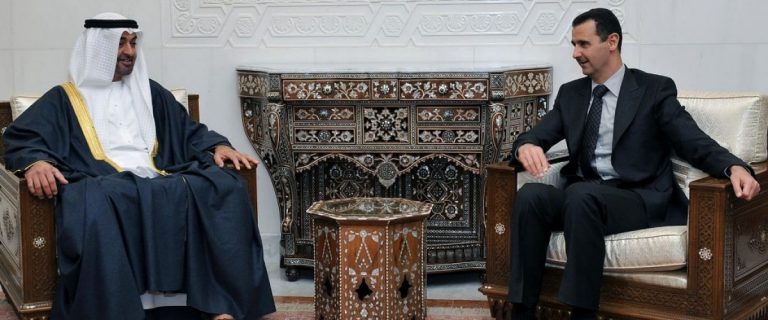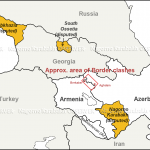The United Arab Emirates is leaving the pro-American orbit in the Middle East and is forwarding to embrace Russia. Abu Dhabi has increased its involvement in providing support to Russian allies in the MENA region.
The United Arab Emirates is training Syrian intelligence and military officers and is giving financial aid to government-owned civilian facilities in Damascus.
The UAE broke off diplomatic relations with Damascus at the beginning of the Syrian civil war in 2011. But relations between the two countries were restored in 2018, when the oil kingdom reopened its embassy in the Syrian capital.
Abu Dhabi began providing logistical, technical and financial assistance to the Syrian government since that time. Emirati instructors are currently training around 40 Syrian military intelligence officers. There are 4 supervisors from Syrian military intelligence, including Zulficar Wassouf, the head of intelligence services training. Among of them 31 are non-commissioned officers, while at least 8 more are information technology and communication systems engineers.
Another group of Emirati instructors are allegedly training members of the Syrian Arab Army’s general staff, including at least five Syrian fighter pilots. The pilots are currently attending an all-expenses paid course at the UAE Air Force’s Khalifa bin Zayed Air College (KBZAC) in Al Ain. The duration of the courses range from 60 days to a year, and are supervised by the intelligence services of the Syrian government. The Syrian supervisory mission at the Khalifa bin Zayed Air College is reportedly headed by Syrian President Bashar al-Assad’s cousin, Lieutenant Colonel Jihad Barakat, who previously commanded Syrian paramilitary units and was a target of U.S. forces.
As the British diplomatic circles inform, the Emirati army ‘is disciplined, highly effective in strategy and logistics, and despite the size it differs a lot from the Saudi forces on its effectiveness in the war in Yemen’.
The report by Orient XXI alleges that the Emiratis have been providing substantial financial aid, medical provisions and food supplies to Syrian government-owned hospitals and welfare centers in Damascus and other regions of the country, which are controlled by al-Assad’s forces. The UAE has already helped rebuilt several public buildings, electric power stations and water plants in Damascus, which were damaged during the war.
The United Arab Emirates’ rapprochement with the Syrian regime goes far beyond the bilateral diplomatic relations normalization and covers the military and security spheres.
On March 27, 2020, Mohamed Ben Zayed (MBZ) tweeted a phone conversation with Bashar al-Assad. The conversation resulted in the Emirates’ proposal to grant $3 billion to Bashar al-Assad in exchange for the resumption of hostilities in Idlib. This financial assistance was supposed to compensate reducing financial flows from Russia and Iran.
Despite the Ceasar Act adopted by the US Congress, sanctions had no impact on Abu Dhabi.
Since the end of 2018, Abu Dhabi has provided medical assistance to hospitals located in the Syrian regime-controlled areas, as well as food supplies. The UAE also funded the reconstruction of public buildings, thermal power plants, and the hydro networks of the Syrian capital.
According to a non-governmental organization SpinWatch, during 2012-2014 the British public relations company Quiller Consultants provided image services to the Free Syrian Army (ASL) to build positive public opinion in Britain; the services were paid by the UAE Embassy in London. Lana Nusseibeh, an Emirati senior diplomat, and Anwar Gargash, Minister of State for Foreign Affairs, coordinated the service order.
Dubai’s Emir, Sheikh Mohammed bin Rashid al-Maktoum, allowed President Bushra Al-Assad’s sister to move to the Emirate in 2012, shortly after the assassination of her husband Assef Shawkat, deputy director of military intelligence.
The UAE’s cooperation with the Syrian regime is closely coordinated with Russia.
Alexander Efimov, current the Russian ambassador to Damascus and special representative of the Russian president for the development of relations with Syria, served as Russia’s ambassador to Abu Dhabi from 2013 to 2018. Putin praised Efimov for his contribution into building relationships between MBZ and his Syrian counterpart.
Strengthening positions in the region and preventing risks of political unrest inside the country are key goals for the UAE.
On the Emirati leaders’ opinion this goal can be achieved exclusively by strengthening authoritarianism and enforcement mechanisms. However, providing following the democratic values of the West it is difficult to be achieved. At the same time, democratic values mean nothing to the Russian leaders. Therefore, Moscow is portrayed as a more attractive ally in the context of the Emirati leaders’ intentions to keep power in the region.
For example, UAE considers its involvement in Libya as a major chapter in the quest for regional hegemony in which it is opposed to Turkey. Abu Dhabi perceives Ankara as a player willing to exploit the upheavals triggered by the Arab Springs to expand its influence in the region. The prominent instrument of Turkish activism is the support to Islamist parties and movements, in many cases affiliated or close to the Muslim Brotherhood.
This strategy stands in direct opposition on several levels to the agenda Saudi Arabia and UAE.
Abu Dhabi and Riyadh perceive potentially Turkish-backed movements as a possible “fifth column” and a potentially destabilizing internal threat. They fear that Islamist groups in the Arabian Peninsula might be useful to Ankara. These groups could increase their activities and multiply popular discontent and radicalize social demands.
Promotion of Islamism in the region is seen by Abu Dhabi and Riyadh as the diffusion of an alternative model in competition with the one offered by UAE’s al-Nayans and al-Saud family. The latter is based upon the control of the State by an autocratic oligarchy, which guarantees both the internal stability and the selective development of the country’s economic policies. The military oligarchy that has risen to power in Egypt with al-Sisi illustrates this model, which has accurately been replicated in Cyrenaica by Haftar. In Eastern Libya, military élites are the very pillar of this system, through extensive control of the Military Investment.
Libya’s role of link between the Mediterranean space and the Sahelian region is also the reason of competence between UAE and KSA.
The UAE are interested in controlling the port infrastructures in Libya. This is a fundamental part of Abu Dhabi’s strategy to become the main regional actor in the maritime trade, while taking advantage of opportunities related to China’s Belt and Road Initiative.
For the Emirates the space for diplomacy in Libya is all the more restricted as Turkish interventionism persists. The Turkish intervention in favour of Tripoli’s internationally recognised GNA, which began in May 2019 and intensified with the arrival of Syrian mercenaries and more sophisticated weapon systems last December, contributes to radicalizing UAE’s stance toward a never-ending support for Haftar offensive. Against this background, therefore, Abu Dhabi has perceived the Turkish-Russian initiative in January as an unnecessary provocation (given the central role played by Turkey in the draft agreement), and the Berlin process as an almost anachronistic attempt, disconnected from the situation on the ground and fundamentally incompatible with its strategic objectives.




